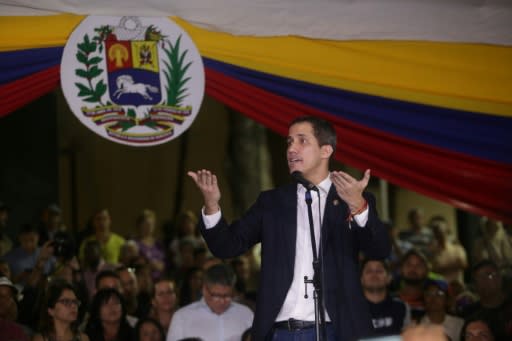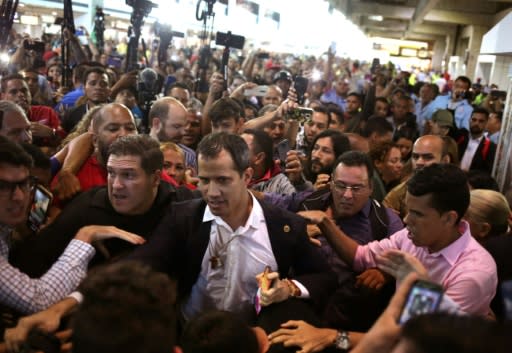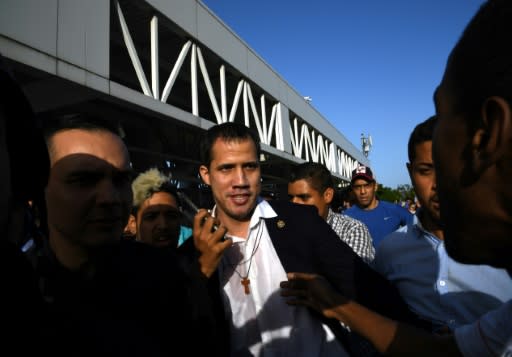Venezuela's Guaido looking to reboot Maduro challenge
Fresh off a three-week international tour, Venezuelan opposition leader Juan Guaido is hoping to ramp up pressure against President Nicolas Maduro but must first overcome his supporters' increasing listlessness. Having flouted a travel ban imposed by the Maduro regime to shore up support abroad and meet with foreign leaders such as those of Britain, France and the United States, Guaido must now find a way to reinvigorate his base. The National Assembly speaker rose to prominence in January 2019 when he declared himself the country's acting president in a direct challenge to Maduro, whom he deems an illegitimate leader due to a 2018 re-election widely derided as rigged. - 'Collapse of expectations' - While Guaido has called for mass mobilization against Maduro, his supporters are suffering from a "collapse of expectations," said Benigno Alarcon, head of political studies at Andres Bello Catholic University. The 36-year-old attracted tens of thousands of people to his rallies at the start of 2019 and garnered the support of more than 50 countries, but by the end of the year only a few hundred supporters would turn up. And his popularity rating dropped from 63 percent to 39 percent, according to pollsters Datanalisis. That said, his international tour was "a fleeting work of art" considering his failure to deliver on the home front, said Luis Vicente Leon, Datanalisis president. On Wednesday, Guaido did manage to generate some excitement as university students took part in a demonstration against Maduro in Caracas. - Sanctions 'on everyone' - After Guaido's meeting with US President Donald Trump, Washington expanded its Venezuela sanctions to include state airline Conviasa. The United States has already sanctioned state oil company PDVSA and imposed a financial blockade that prevents Venezuela from renegotiating its $140 billion debt. "There will be more sanctions... on everyone who supports the dictatorship," Guaido warned on Wednesday. In Brussels, Guaido urged the European Union to block Venezuelan exports of gold, which have already been hit by US sanctions. Such actions point to "a sanctions scheme with greater international coordination," Alarcon said. Guaido was meanwhile given a bipartisan standing ovation at Trump's State of the Union address, fueling renewed calls from the most radical elements of Venezuela's opposition for Washington to deliver a military intervention. While the US government has repeatedly refused to rule out such an option, the American public has shown little interest in a dramatic dislodging of Maduro. "The Trump administration has few options available to effect a material change," said Paul Angelo of the US-based Council on Foreign Relations. Instead, said Alexander Main of the Center for Economic and Policy Research, US policy has "exacerbated Venezuela's economic crisis, resulting in increased human suffering." The United States' Venezuela policy "is tightly linked to electoral strategy" in a bid to win Latin votes rather than help the Venezuelan people, he said. - 'Position of strength' - Maduro has said he's willing to relaunch a dialogue with the opposition following failed Norway-mediated efforts in 2019. However at the World Economic Forum in Davos, Switzerland last month, Guaido branded that a "joke." The Venezuelan government, which is supported by the military as well as China, Russia and Cuba, is in a "position of strength," said Alarcon. There's little chance of Maduro giving in to the opposition's demands that he resign and allow new general elections. Meanwhile legislative elections are scheduled for later this year in which Maduro hopes to regain control of the National Assembly, the only branch of government in opposition hands. The opposition has little faith that the vote will be free or fair, and many are debating whether to even participate at all, experts say. In addition, the opposition is once again becoming fragmented. A rival opposition politician, Luis Parra, declared himself speaker in Guaido's absence. While Maduro backed Parra's claim, Guaido says he still has the support of more than half of the opposition-controlled National Assembly. Juan Guaido, speaking at a rally on February 11, returned to Venezuela with renewed vigor and the belief he can fire up street protests once again Juan Guaido received a mixed reception at the Caracas international airport on February 11 with some Maduro supporters calling him a 'fascist' and 'traitor' Juan Guaido, pictured February 11, has urged his international allies to ramp up sanctions against Maduro's regime




